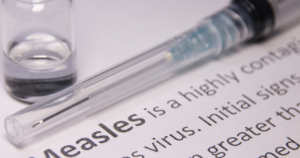Physical Address
304 North Cardinal St.
Dorchester Center, MA 02124
Physical Address
304 North Cardinal St.
Dorchester Center, MA 02124

The Changing Landscape of American Immigration Requirements
The conditions for U.S. immigration have changed significantly in recent years, and one of the most recent modifications concerns vaccination requirements. This article will discuss the recently implemented vaccination requirements for immigrants, those applying for green cards, and those seeking citizenship, which include the COVID-19 and influenza vaccines.

Updated Vaccination Requirements Overview
The U.S. government has increased its immunization requirements for persons seeking immigration benefits in response to the current COVID-19 outbreak. The new requirements include COVID-19 and seasonal influenza vaccines, as opposed to the previous limitations on certain vaccines.
Reasons for Raising Vaccination Requirements
Public health issues are the basis for the extension of vaccination regulations. The government wants to lower the risk of outbreaks and safeguard the health of its citizens by requiring that immigrants entering or residing in the U.S. receive vaccinations against contagious diseases.
Information on the COVID-19 vaccination requirement: As of [Date], all citizens and those seeking green cards must show documentation of their COVID-19 vaccine. This includes showing a legitimate vaccination card or official documents, as well as getting the recommended doses of an authorized COVID-19 vaccine.
Putting into Practice and Complying: If you don’t fulfill this condition, you risk having your immigration case delayed or possibly being turned away. For their immigration process to run well, applicants must comprehend and abide by this requirement
The Function of Seasonal Flu Shots: In addition to receiving a vaccination against COVID-19, applicants must also show proof of yearly influenza immunization. This rule aims to protect the immigrant population’s general health and handle the seasonal flu threat.
How the influenza vaccine relates to immigration requirements: Citizenship and green card applicants must be ready to show documentation from a doctor or vaccination clinic as confirmation that they have received the flu shot, which is normally required.
How New Vaccination Requirements Impact Those Applying for Green Cards: Those applying for a green card should be aware that the new vaccine requirements are now a crucial step in the immigration procedure. If these conditions are not met, getting legal permanent residency may take longer.
Methods for Completing Vaccination Requirements: To ensure they have the necessary records to prove compliance, applicants should arrange their vaccination appointments before their immigration interviews.

Process for Applying for Citizenship and Vaccination Requirements: Following the immunization requirements is essential for those who want to become citizens of the United States. Along with other necessary documentation, citizenship aspirants must also show proof of their COVID-19 and influenza vaccinations.
Implications for Future Americans: Aspiring citizens of the United States should factor vaccination into their immigration process, realizing that it is not just a legal requirement that may affect their citizenship application but also a health measure.
Documentation and Medical Exemptions: Although the majority of candidates must be immunized, there are opportunities for medical exemptions. Applicants may be exempted if they have legitimate medical grounds, such as allergies or specific medical disorders. To support their request for an exemption, they must produce the necessary medical documents.
Exemptions based on religion or philosophy: Some people may ask for religious or philosophical exceptions. Such requests are examined, though, so applicants must be ready to offer a strong justification for their exemption.
Making Vaccine Access Equitable: It is crucial to guarantee that all immigrant communities have fair access to vaccines to make compliance with these vaccination requirements easier. To address vaccination hurdles, outreach, education, and vaccine delivery programs should be put in place.
Getting Rid of Vaccination Obstacles: Lack of insurance, concerns about immigrant status, and language issues can all be barriers to immunization. Healthcare practitioners and community-based organizations can be quite helpful in assisting immigrants in overcoming these obstacles.
Addressing Potential Implementation Challenges: The implementation of these new vaccination laws presents issues about document verification, allowing for exemptions, and guaranteeing fairness in the immigration procedure. Authorities must appropriately handle these difficulties.
Keeping Immigration and Public Health Policies in Balance: The way the government handles vaccination mandates underscores the delicate balance between regulating immigration and preserving public health. It will be difficult to maintain this balance.
Possibility of Increasing Vaccination Requirements: Further extensions of vaccination mandates may be necessary as the landscape of infectious diseases changes. Those seeking citizenship, a green card, or both should remain abreast of any changes and be ready for them.
Maintaining Knowledge and Compliance: Applicants should stay updated about vaccination needs, interact with healthcare professionals, and ensure compliance with all pertinent legislation to effectively navigate the changing immigration landscape.
An important development in the immigration process is the new immunization requirements for immigrants to the United States. Immigrants, people applying for green cards, and people seeking citizenship can navigate this changing environment and improve the health and well-being of the country by being aware of these criteria, getting the necessary vaccines, and staying informed.
References